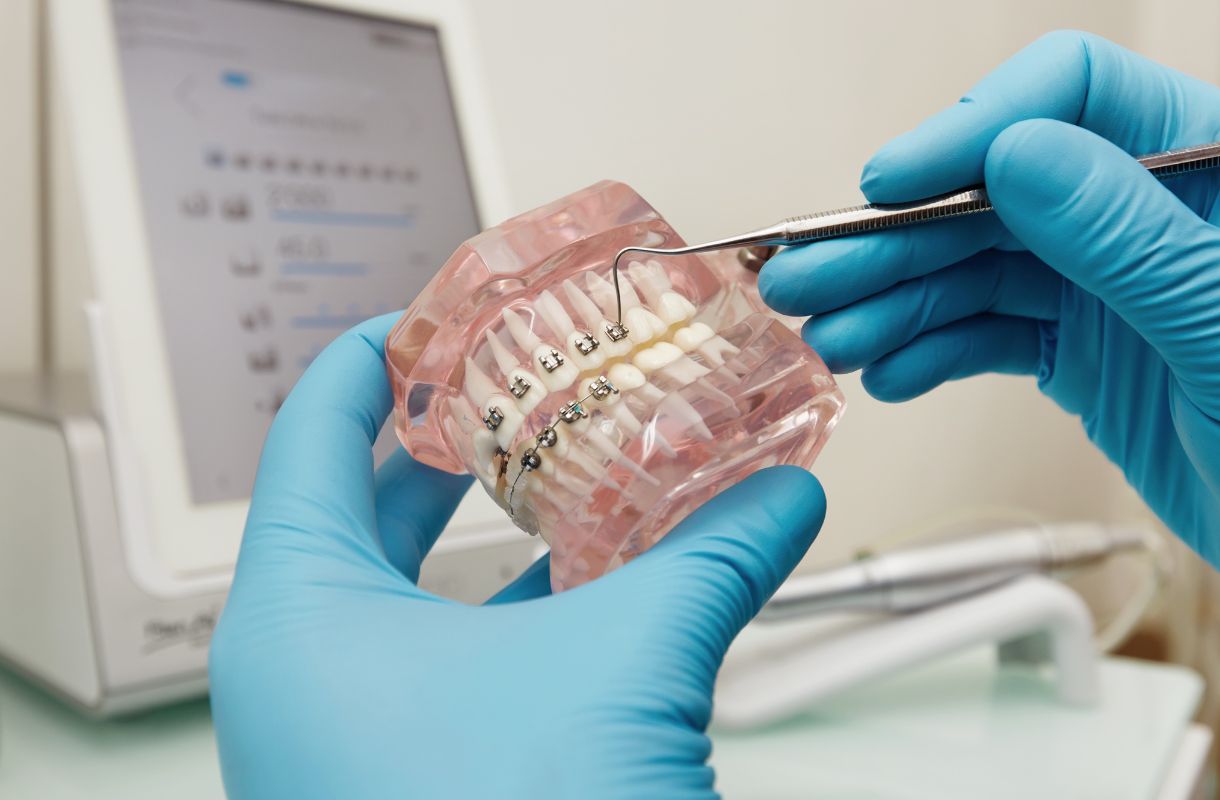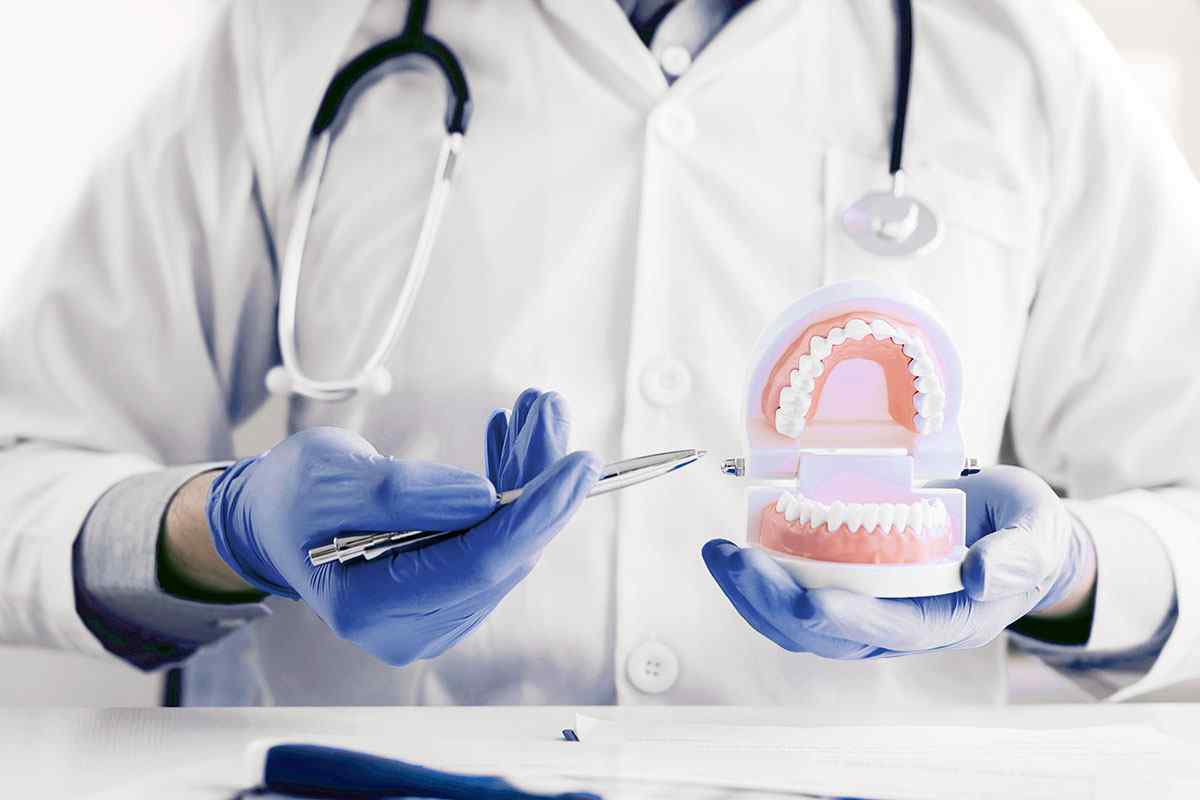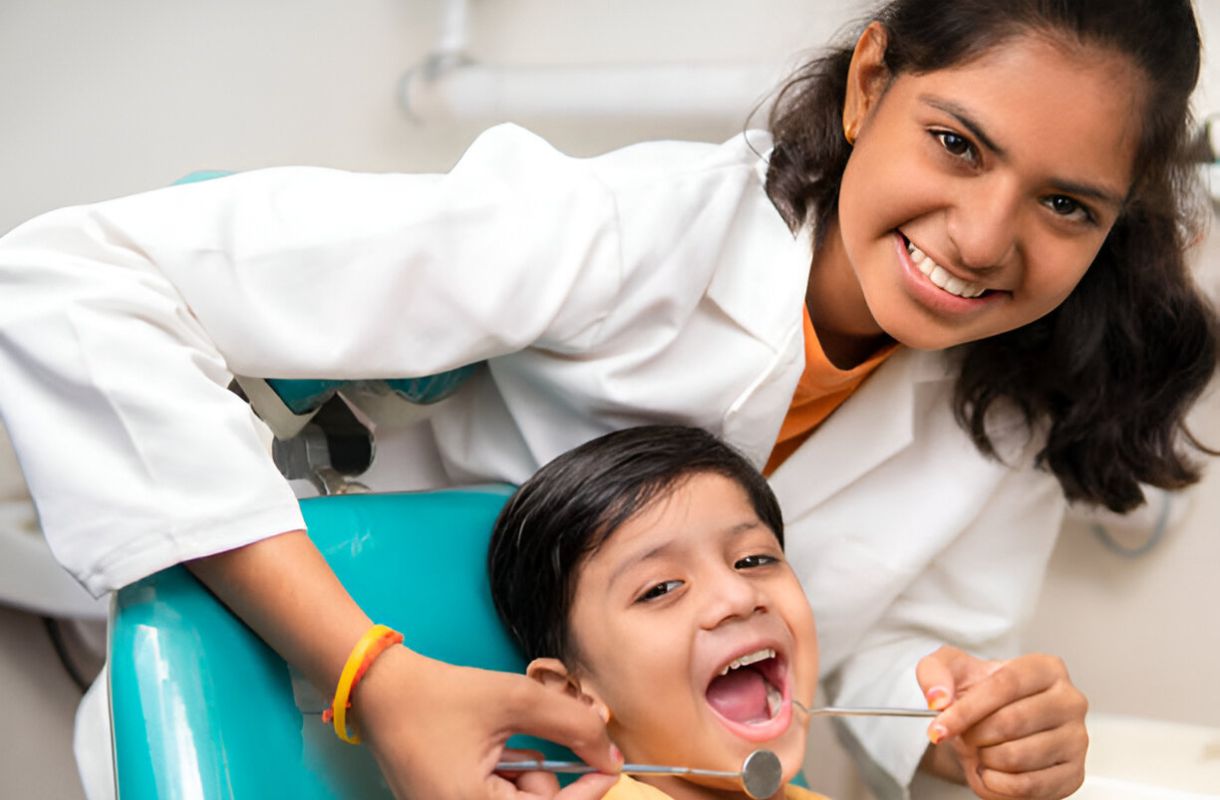What is
Orthodontic Treatment?
Orthodontic treatment, particularly braces, has become an essential aspect of dental care for people of all ages. At Smiline Dental Hospital, we offer comprehensive orthodontic services to address a wide range of dental issues and create beautiful, healthy smiles.
Who Needs Braces?
Orthodontic treatment is recommended for individuals experiencing:
- Misalignment of teeth
- Gaps or spaces between teeth
- Bite problems (excessive overbite, underbite, or open bite)
Modern orthodontic technology has significantly reduced treatment time, friction, and discomfort, making braces more comfortable and less noticeable than ever before.
Benefits of Braces
Orthodontic treatment offers numerous advantages beyond aesthetics:
- Improved Confidence: A beautifully aligned smile can boost self-esteem and encourage more open, confident interactions.
- Better Oral Health: Properly aligned teeth are easier to clean, reducing the risk of cavities, staining, and gum disease.
- Enhanced Sleep and Breathing: Correcting jaw alignment can positively impact airway and sleep issues.
- Improved Speech: Addressing dental misalignments can help minimize speech impairments caused by malocclusion.
Types of Braces
Smiline Dental Hospital offers various orthodontic options to suit different needs and preferences:
Metal Braces
- Regular Metal Braces: Traditional stainless steel brackets and wires, smaller and less noticeable than in the past.
- Self-Locking Metal Braces: Use a special clip instead of rubber bands, reducing friction and requiring fewer orthodontist visits.
Clear/Ceramic Braces
- Regular Clear Braces: Made of clear ceramic materials, less visible than metal braces but require careful oral hygiene.
- Self-Locking Clear Braces: Virtually invisible, with no metal clips or elastic ties.
Lingual Braces
Positioned on the back of the teeth, lingual braces are nearly invisible and custom-fitted for each patient. They are effective for complex misalignments but may not be suitable for severe overbites.
Can I Get Braces if I Have Crowns and Missing Teeth?
Yes, you can get braces even if you have crowns and missing teeth. Here’s how these situations are typically handled:
Teeth with Crowns: Braces can be applied to teeth with crowns. The movement of a crowned tooth is similar to that of a natural tooth. However, special care is taken to ensure that the crowns remain intact and that the braces are applied effectively.
Missing Teeth: Spaces due to missing teeth can usually be addressed as part of orthodontic treatment. In many cases, the orthodontist will focus on aligning the remaining teeth and may use space maintainers to keep the area ready for future tooth replacement.
Collaborative Approach: Your orthodontist may collaborate with your dentist to develop a comprehensive treatment plan. This might include strategies for replacing missing teeth after the orthodontic treatment is complete.
Can I Eat All Kinds of Foods While Having Braces?
While you can eat a variety of foods with braces, it’s important to avoid certain types to prevent damage and maintain the effectiveness of your treatment.
Here are some key restrictions:
Foods to Avoid:
- Hard foods (e.g., hard candy, ice)
- Sticky treats (e.g., gum, caramel, toffee)
- Chewy or crunchy items (e.g., nutty chocolates, popcorn)
Why These Restrictions Matter:
- Prevent damage to brackets and wires
- Reduce the risk of broken appliances
- Minimize the need for emergency appointments
- Ensure your treatment progresses as planned
By following these dietary guidelines, you can help protect your braces and maintain good oral hygiene throughout your orthodontic treatment.
Steps to Take if an Issue Arises
If you encounter any discomfort or problems with your braces, follow these simple steps for relief until your next appointment.
Spacer Loss
If a spacer falls out, you can replace it easily. Thread dental floss through the spacer, double it back, and slide the spacer between the teeth using the floss. Pull the floss out gently while keeping the spacer in place.
Initial Soreness & Tooth Mobility
It’s common to feel soreness after braces are first placed or adjusted, and this will subside in a few days. Over-the-counter pain relievers can help. Mild tooth mobility is also normal as the bone around the tooth softens during movement but hardens once the tooth settles.
Wire Issues: Poking or Displaced Wires
As teeth move, wires may protrude. Use nail clippers to snip the wire close to the brace. If it’s uncomfortable but you can’t cut it, apply wax over the wire. If a wire comes out of a brace, reinsert it using tweezers.
Broken Brace or Wire
If a brace breaks but isn’t painful, it can stay in place. If it’s uncomfortable, remove the tie with tweezers. Broken wires can be clipped near the brace with nail clippers. Most breakages happen due to hard or sticky foods.
Loose Expander
If your expander becomes loose, avoid activating it until your next visit. Try to push it back onto the tooth temporarily.
Poking Wire Tie & Sharp Brace Feelings
If a wire tie feels sharp, use a pencil eraser to push it into a more comfortable position. If the tongue side of a back brace feels sharp, use a spoon to push the rubber band attachment back into place.
Brace Tie Loss
If a tie comes off, it can often be replaced with tweezers. If you can’t replace it, schedule a visit with the clinic.
The Smiline Advantage
At Smiline Dental Hospital, we pride ourselves on:
- Expertise: Our experienced orthodontics team uses the latest products and techniques to design natural-looking smiles.
- Personalized Care: We tailor our approach to each patient’s unique needs and goals.
- Comprehensive Treatment: Our focus extends beyond aesthetics to address overall oral health and function.
- Advanced Technology: We employ innovative approaches to ensure the best possible outcomes.
Dedication to Service: We’re committed to providing exceptional care and support throughout your orthodontic journey.
FAQs
Do I need to have teeth extractions for braces treatment?
At Smiline, our orthodontic team has developed techniques that often allow us to treat most cases without needing to extract healthy adult teeth. However, in certain situations, extractions might be recommended to achieve the best results.
How long does braces treatment take?
Braces treatment generally takes between 12 to 24 months. However, the duration can vary based on the specific orthodontic issues and the complexity of the case.
Are braces expensive?
The cost of braces varies depending on the complexity of each case. During your initial consultation, we’ll discuss the specific cost and go over our interest-free financing options to make the payment process easier.
Does getting braces cause pain?
While braces themselves typically don’t cause pain, patients may experience soreness due to the tightening of the braces.
Can I continue playing sports with my braces?
Yes, you can continue playing sports with braces! However, we recommend wearing a mouthguard to protect your teeth and braces from injury.
Is it too late for an adult to get braces?
It’s never too late for braces! Over 25% of orthodontic patients are adults. Orthodontic treatment at any age can improve oral health, function, and confidence.
How often do I need to brush while in braces?
Brush at least twice a day—morning and night. Ideally, brush after every meal to remove food particles and prevent plaque buildup. Use dental floss and an interdental brush as instructed for optimal oral hygiene.
Orthodontics
Get In Touch With Us
Call us
+91 9676100045
+91 7702435551
+91 7702435551
Email us
reception@smiline.com
Book An Appointment
Book a visit to Smiline, simply fill out the form below and we will contact you back regarding the intervention you require.




